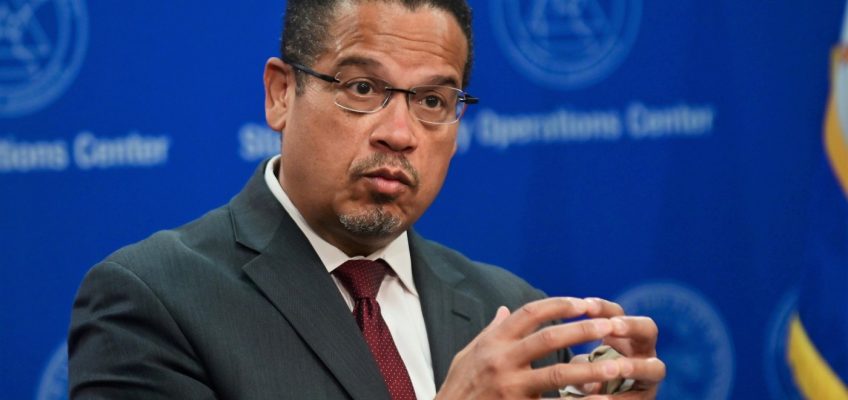Minnesota officials are taking action to defend a new state law restoring felon rights after a Minnesota judge barred felons on probation from voting.
Attorney General Keith Ellison on Friday said he is intervening in two cases now before the Minnesota Court of Appeals seeking to overturn orders from Mille Lacs County Judge Matthew Quinn, who in at least six cases this month told people he sentenced they could not vote. The attorney general’s involvement comes after public defenders sought appeals court intervention earlier in the week.
Ellison and attorneys for the people Quinn sentenced are arguing the judge exceeded his authority in deeming newly restored felon voting rights unconstitutional. With local elections a little over two weeks away, they’re asking the appeals court to toss the judge’s ruling, which they say was an improper exercise of judicial power. The motions are called writs of prohibition.
“Voting rights are not up for debate in a criminal sentencing,” Ellison said at a news conference announcing his involvement Friday in St. Paul. “These unprecedented abuses of authority are the first reason we’re intervening. … The second reason we’re intervening is Judge Quinn is just wrong on the law.”
A new law Minnesota enacted earlier this year gave the vote back to more than 50,000 Minnesotans serving probation. Restoration came after decades of advocacy at the capitol and a yearslong lawsuit that ended up at the state Supreme Court, where justices upheld the old ban but handed the issue back to the state Legislature. Advocates called the law the “Restore the Vote Act.”
Secretary of State Steve Simon, who joined fellow Democrat Ellison at Friday’s news conference, said state officials can’t allow for distortion of Minnesota’s voter eligibility rules and called Quinn’s order “open defiance.” He also assured tens of thousands of others across the state that Quinn’s ruling doesn’t affect the law anywhere else in the state.
“These orders apply only to the individual cases; they have no statewide or even county-wide reach,” Simon said. “For everyone outside of this one judge’s courtroom, ‘Restore the Vote’ remains the law of the land.”
Simon also noted the urgency of resolving the matter, as voting in local elections is weeks away on Nov. 7, and early voting in Minnesota’s presidential election primary starts in January.
So far this month, Quinn has ordered six defendants’ voting rights suspended until the completion of their probation sentences, according to Ellison. In his rulings, Quinn said the new law restoring felon voting rights did not change the fact that the state Constitution still contains language restricting felons from voting.
Under previous law, felons in Minnesota could not vote until they completed their parole or probation and paid fines related to their sentence. The state Constitution bans felons from voting until “restored to civil rights,” and a 1963 law defined that as the end of probation. The 2023 update changed the law so that voting rights are only lost during incarceration.
In his opinions, Quinn said the Minnesota Constitution calls for restoring felon voting rights “upon the occurrence of certain events” and claims the new law does not change the basic constitutional restriction. He suggested the best remedy would be for the state to hold a constitutional referendum to allow voters to address the issue.
Felon voting rights restoration was a top issue for DFL lawmakers and state officials this year and has generally been opposed by Republican lawmakers and conservative groups in Minnesota.
Quinn, who was appointed to his post as a 7th District judge by DFL Gov. Mark Dayton in 2017, was disciplined by the Board on Judicial Standards in 2021 for posting pro-Donald Trump messages on social media and other partisan political activities and statements. Minnesota has a non-partisan judiciary, and judges are barred from endorsing and opposing political candidates.
Minnesota was one of 16 states, including South Dakota and Wisconsin, that only allow people with felony convictions to vote upon 100% completion of their sentence. North Dakota does not allow people in prison to vote but does not have any other restrictions after release.
Twenty-three states automatically restore voting rights to people upon release, according to the National Conference of State Legislatures.
Related Articles
Third Republican to challenge Angie Craig for 2nd Congressional District seat
With $300M in public safety aid funding throughout state, St. Paul is focusing on gun violence
$22M in public financing aims to turn shuttered Iron Range wood plant into cannabis factory
Walz orders flags at half-staff to mourn, honor victims of terrorist attacks on Israel
Special election for legislative seat including Mendota Heights attracts six candidates


Leave a Reply